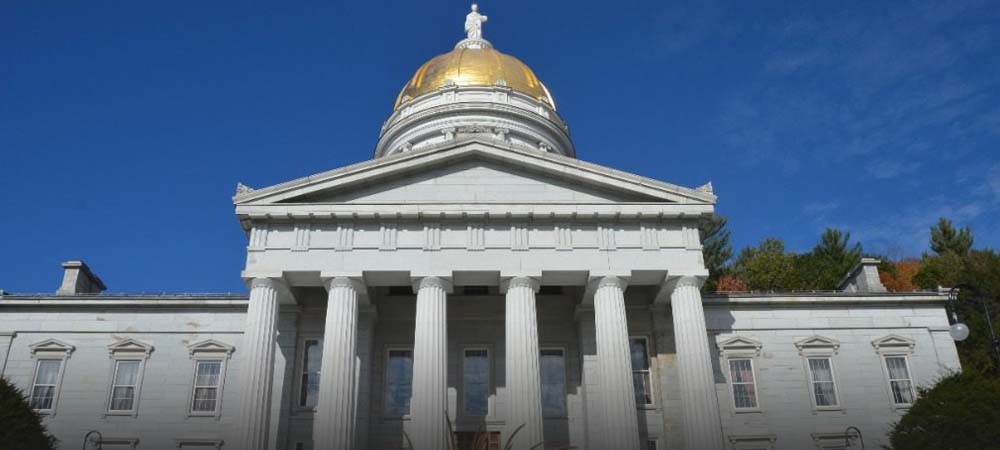- A Vermont sports betting bill has easily passed the House Ways and Means Committee, now moving to the Appropriations Committee.
- The bill has strong bipartisan support with nine total sponsors.
- Sports betting taxes are planning to be used to create a Responsible Gaming Special Fund.
MONTPELIER, Vt. – Bipartisan legislation is making its way through the Vermont House of Representatives, seamlessly passing through its first round of committee votes and now heading to the Appropriations Committee. Vermont is looking to boost their tax revenue and follow in the footsteps of their neighboring states by pushing through the legislation.
One thing that sets this bill apart from many others around the country is the bipartisan support it has, with three Republican as well as six Democrat sponsors. The bill will also be a major benefit to prevent Vermont sports betting traffic from being hijacked by the three surrounding states and their betting markets.
What Does HB 127 Accomplish?
VT HB 127, which was introduced by Rep. Matthew Birong on January 31, seeks to create a legal sports betting market in Vermont. The bill importantly aims to protect consumers, increase Vermont’s tax revenue, and provide resources to bettors that may be struggling with problem gambling.
A major issue that prompted the House Ways and Means Committee to look into a proposal like VT HB 127 was the prevalence of Vermont bettors utilizing New York, New Hampshire, and Massachusetts sports betting markets. With tons of revenue that Vermont is never going to see, it further incentivized the legislature to pass the bill.
The bill would establish the Department of Liquor and Lottery as the regulating body to oversee the creation of the sports betting market. In addition, the Lottery Commission would have to greenlight at least two, but no more than six Vermont online sportsbook permits.
The annual license fee for each sportsbook would be $275,000.
Taking The Necessary Steps
In order to combat potential pushback from the bill’s opponents, Birong has worked to specifically make a portion of the bill address social issues with gambling. This statute states that every licensed operator must submit a “responsible gaming plan” to the government yearly, which details how they will offer resources and programs to help those with a gambling addiction.
In addition, annual reports concerning the impact of legalization on problem gambling from the Liquor and Lottery Department are required to be submitted and reviewed by the Department of Mental Health.
Vermont has also taken the rare approach of planning to launch exclusively online sports betting. This is mainly because the state lacks any casinos or racetracks and is not as densely populated as some of its neighbors. The idea of scoping out potential locations for retail gambling has been floated, but is not included in HB 127.
Another great sign for the future of legal sports betting in Vermont is that Governor Phil Scott vocalized his support earlier in the year for bills like HB 127. The legalization of sports betting in Vermont is expected to net between two and 10 million dollars of revenue.
Overall, Vermont is looking to join the over 30 states across the USA that have already regulated sports betting as well as mirroring the rest of the New England area that have completed the process. With support from both the Governor and bipartisan sponsors as well as a meticulously crafted bill, there is certainly growing confidence that Vermont will join the sports betting legalization movement that is sweeping the nation.
Advertising Disclosure
In order to provide you with the best independent sports betting news and content LegalSportsBetting.com may receive a commission from partners when you make a purchase through a link on our site.
News tags: Massachusetts | Matthew Birong | New Hampshire | New York | Phil Scott | Vermont | VT HB 127

Jeremias is a current Florida State University student majoring in Editing, Writing and Media as well as Media/Communication studies. Primarily focused on the NFL, NBA, and NHL, Jeremias has a passion for sports statistics research that helps bettors find the blind spots in sportsbooks.



 College Football Betting
College Football Betting Best Online Sports Betting
Best Online Sports Betting Best Legal NFL Betting
Best Legal NFL Betting States With Legal Sports Betting
States With Legal Sports Betting Sports Betting Events
Sports Betting Events




